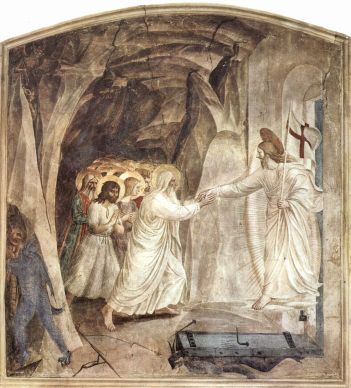“He descended into hell.” The Apostles’ Creed (359 A.D.)
According to the Gospels, Jesus’ disciples mourned his death and hid in fear. According to Luke, the women prepared spices and ointments on Friday, rested on the Sabbath and went to the tomb on Sunday. (Luke 23:56).
What did Jesus do on Saturday?
While the Bible offers no explicit answer to that question, that didn’t stop the earliest Christians from gleaning all they could from all relevant Scriptures, and eventually including the phrase “He descended into hell” in The Apostles’ Creed. One big concern back then — and today — is what happened to those who never knew of Christ.

Christ in Limbo, Fresco by Fra Angelico
Is there a temporary place for the spirits of the dead?
Many 1st century Jews and early Christians found Scriptural support for a temporary place where spirits of the dead wait for the end of history. In the Old Testament this place is Sheol, and in the New Testament it is known as Hades. These two are identical in Acts 2:27 where Peter quotes from Psalm 16:10:
“…you will not abandon me to the realm of the dead (Sheol / Hades), nor will you let your faithful one see decay.”
Is there hope for the unrighteous dead?
Some early Christians also found Scriptural support that redemption is possible for those who are in Sheol / Hades. Souls can be ransomed from Sheol (Ezekiel 37:12; Hosea 13:14; Jonah 2:2, 6). The Psalmist declares:
“But God will redeem me from the realm of the dead (Sheol); he will surely take me to himself” (49:15).
Early Christians also found hope in the Gospels: Saints are raised with Jesus and appeared to many (Matthew 27:51–54). Jesus speaks of forgiveness in this world and in the world to come (Matthew 12:32). He also speaks in the present tense of the dead hearing the voice of God:
“Very truly I tell you, a time is coming and has now come when the dead will hear the voice of the Son of God and those who hear will live” (John 5:25).
Did Jesus visit the dead on the first Holy Saturday?
1 Peter envisions Christ preaching to spirits who are in prison (1 Peter 3:19–20; 4:6). The teaching that Christ descended into Hell (Hades) after his crucifixion was supported in various Scriptures (Acts 2:31; Ephesians 4:9–10; 1 Peter 3:19–20), including the words of Paul, where Christ had “descended into the lower parts of the earth” (Ephesians 4:8–9). Jesus’ words to Peter seem to portray the church as being on the offensive against the underworld:
“…on this rock I will build my church, and the gates of Hades will not overcome it” (Matthew 16:18).
The Most Important Truth
Many Christians have understood the word Sheol to mean grave. Even if one understands “He descended into hell” as a reference to Christ’s time in the tomb, that phrase can still be a reminder that Jesus is Lord over all of the darkness in the world, and he is present in most miserable of places. In the words of Paul:
“For I am convinced that neither death nor life, neither angels nor demons, neither the present nor the future, nor any powers, neither height nor depth, nor anything else in all creation, will be able to separate us from the love of God that is in Christ Jesus our Lord” (Romans 8:38-39).


Pingback: What Did Jesus Do on the First Holy Saturday? « HUNTINGTOWN UNITED METHODIST CHURCH
This is an interesting topic. I had written about this topic a while back…
http://bigalscorner.blogspot.com/2011/04/holy-saturday-day-of-few-words.html